By Pam Danziger
In a recent column in Luxury Daily, I posed the question, “New Luxury, Old Luxury; Real Luxury, Faux Luxury – What’s a Brand to Do?” It got me thinking more about what exactly makes a brand “luxury.”
To research the question, I happened upon a section from my book, Putting the Luxe Back in Luxury: How New Consumer Values Are Redefining the Way We Market Luxury (Paramount Market Publishing, 2011), about the 10 essential values that a luxury brand must encompass, using heritage luxury brand Montblanc as an example.
In reviewing these luxury brand criteria, it is clear that new luxury Shinola also measures up, too.
To delve deeper into understanding what makes a brand luxury and why – whether it is a new brand such as Shinola or a classic one such as Montblanc – brands need to deliver the same essential values to the customers.
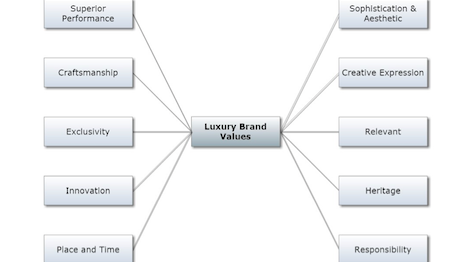 At the core of luxury
At the core of luxury
Let us examine each value more closely:
• Superior performance. A luxury brand connects with its customers by being at the top of its class, the best in its field. It must deliver in some meaningful, measurable way better performance.
Montblanc: Montblanc has been renowned worldwide and for more than a century as a producer of superior quality fountain pens. The Meisterstuck is Montblanc’s classic fountain pen that was first produced in 1924.
Shinola: Shinola’s United States-built Runwell watch is the watch of presidents. President Bill Clinton has worn one for years. And President Barack Obama is a huge fan, so much so that he commissioned the company to create a custom-made watch to gift to then British Prime Minister David Cameron. It is as close as we come to the British Royal Warrant granted to tradespeople serving the Queen.
• Craftsmanship. Luxury brands connect with customers by presenting the highest quality and craftsmanship. The connection is intimate and personal, like the touch of the hand.
Montblanc: The Montblanc Web site celebrates the traditional craftsmanship and artistry that goes into every pen. To certify quality, every pen is capped with a nib made from a band of 18K gold.
Shinola: Shinola’s Built in Detroit roots link to the craftsmanship and engineering embodied by the city as the country’s automotive capital. In a watch factory located in a historic Detroit landmark building, once the home of General Motors’ automotive research lab, the company hand-assembles every Shinola watch.
 Montblanc channels JFK
Montblanc channels JFK
• Exclusivity. Luxury brands connect with customers by making them feel special and unique through the presentation of a special, unique experience. Exclusivity today is less about excluding people from enjoying the brand or limiting access. Rather, it is about making customers and brand loyalists feel a member of an exclusive community linked by shared values and ideals.
Montblanc: A Montblanc pen is not just a pen. It is a fine writing instrument designed to be collected and cherished. It is far from ordinary or even premium. It is only for those who truly value its unique and innate qualities.
Shinola: Adweek recently proclaimed Shinola “the coolest brand in the world.” Who would not want to belong to that tribe? And its story of revitalizing American-quality manufacturing resonates deeply with the zeitgeist of today’s consumer culture.
• Innovation. Luxury brands connect with customers by presenting new visions and new ideas, all in keeping with the core values of the brand.
Montblanc: Montblanc has used its heritage, craftsmanship and expertise in fine materials to expand its product range to jewelry, watches and leather goods. These ranges are totally new, but in keeping with the core brand heritage.
Shinola: Shinola’s entire brand myth is based upon the idea of innovation, rebirth and ingenuity. It is reflected in its products and processes, as well as in its design of retail locations. With made in Detroit as its core value, the company recently paid tribute to the city’s musical roots by creating a new line of audiophile equipment of turntables, headphones and speakers.
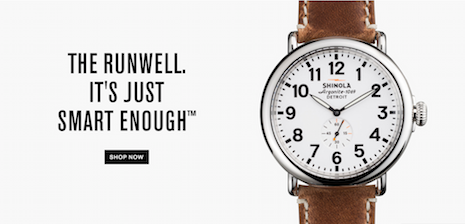 It's Shinola's time
It's Shinola's time
• Sense of place and time. Luxury brands connect by being both timely, grounded in the here and now, and timeless, transcending time from the past to the future.
Montblanc: Montblanc presents a profound understanding of its place and time, from the past with the brand named after the highest European mountain peak to the present, offering old-fashioned writing instruments for special customers who crave an alternative to the fast pace of contemporary life. The company recently released a redesigned 1906 Rouge et Noir pen, thus reinterpreting yesterday’s pen for today’s connoisseur.
Shinola: Shinola’s Built in Detroit tagline says it all. It hearkens back to the past century’s industrial revolution and looks forward to the future with 21st century engineering and manufacturing prowess.
• Sophistication and design aesthetic. Luxury brands connect with their customers with an appreciation of the customers' sophistication celebrated through the brand's unique design aesthetic.
Montblanc: A Montblanc writing instrument is a work of art with every feature carefully designed to enhance the customer's writing experience.
Shinola: From its watches to its bicycles, leather goods, writing journals and other products, Shinola prides itself on a distinctive and unique design aesthetic that is both classic and contemporary. Its flagship stores also showcase the brand’s unique vision, which its creative director Daniel Caudill describes as the “intersection of clean minimalism and 1930s industrialism.”
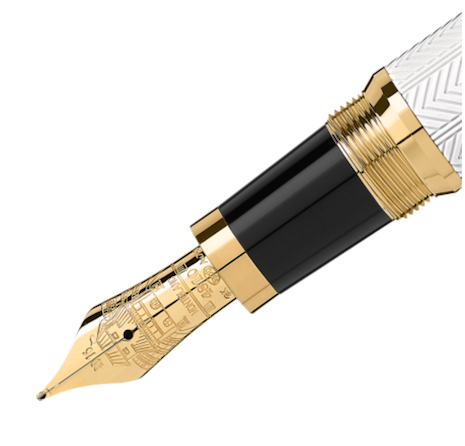 Nib of the matter for Montblanc
Nib of the matter for Montblanc
• Creative expression. Luxury brands connect through the spark of artistic creativity as interpreted through the eyes of a designer or visionary.
Montblanc: Montblanc honors the writing craft by offering a line of "Writer Edition" pens to celebrate their literary achievement. Inspiration for this line includes Hemingway, Agatha Christie, Edgar Allan Poe and Oscar Wilde, to name few.
Shinola: Shinola publishes an online journal where it features stories about its designers and their design. A recent edition showcases the story of industrial designer Colin Tury and his work in creating the company’s turntable line.
• Relevant. Luxury brands connect by being relevant to their customers' lives and lifestyle. Relevancy makes the brand special and bespoke for the individual.
Montblanc: For the first time in its history, Montblanc created a design partnership with Marc Newsom to create what the company describes as “a new generation” of writing instruments. The new line includes a classic fountain pen, but also a rollerball, a ballpoint, a screenwriter for touchscreen tablets and an ultra-fine line pen suitable for artists and technical draftsman. With prices in the $400 to $600 range, the Montblanc M collection is an affordable on-ramp for new customers to the brand.
Shinola: With aims to become a true lifestyle brand, Shinola continues to tap its creative team and manufacturing expertise in creating new and unexpected products across a whole range of lifestyle endeavors. Besides its core watch, bicycle and leather goods offerings, the company has dog leashes and other pet accessories, footballs and sporting goods, pocket knives and screw driver sets, apparel, travel guides, and next on deck, a line of Shinola jewelry.
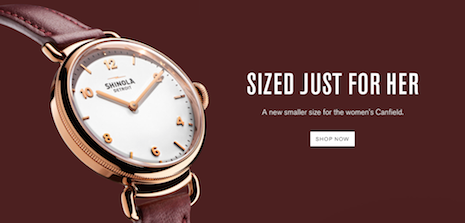 Sizing up the market
Sizing up the market
• Heritage. Luxury brands connect with their customer through the story of its lineage and provenance.
Montblanc: When a customer buys a Montblanc pen, he or she is becoming part of a celebrated 100-plus-year heritage that includes distinguished users such as President John F. Kennedy, Ernest Hemingway, Iris Murdoch, Anne Frank, Queen Elizabeth II and many other notables.
Shinola: Though it has only been in business since 2012, Shinola’s tie to Detroit links it to early days of the automobile and the industrial revolution. Further, the brand takes its name from a 1907 shoe polish company that became part of the American cultural myth when a disgruntled World War II soldier polished his commander's boots with poop, proclaiming that he "wouldn't know shit from Shinola."
• Responsibility. Luxury brands connect with their customers on a platform of social responsibility and giving back and doing good.
Montblanc: Montblanc has a long history of supporting the arts in keeping with heritage of fine writing, including the Montblanc Cultural Foundation and a Power of Words project launched with partners, the Nelson Mandela Foundation and the Tribeca Film Institute in April 2013. The company has also long supported the work of UNICEF to promote quality education and fight illiteracy across the globe.
Shinola: Shinola’s interpretation of corporate responsibility is nothing less that bringing manufacturing jobs and investment dollars back to Detroit. Many of its philanthropic endeavors are focused on rebuilding Detroit, with a recent project creating a dog park and green alleys near its company headquarters. And in partnership with the FEED Project, it designed a line of canvas and leather FEED bags, with the proceeds of each sale donated to Detroit’s only food rescue organization, Forgotten Harvest.
THE TITLE of “luxury brand” must be earned in the mind of the consumers. It cannot be a label that a brand claims for itself.
While brands that aspire to the designation of luxury share these 10 core values, each brand must interpret and express its luxury distinctly and in such a way that is authentic unto itself and that resonates in the minds of the customers.
Whether heritage luxury such as Montblanc or new luxury such as Shinola, the real luxury of the brand is not only or mostly about its products, its manufacturing processes, its design and style or its service. It is about a commitment to each of these values, from those working on the shop floor to the corner office, that is carried over to the customers.
For luxury, ultimately, is not a product or a price point, but a mindset.
The core values expressed by the brand must link the company and its staff’s dedication to quality with customers’ values and aspirations. It is these people, not the product, that make a “luxury brand.”
 Pam Danziger
Pam Danziger
Pam Danziger is president of Unity Marketing, Stevens, PA. Reach her at [email protected].
{"ct":"qPiVUIE25yj4r2687Au4ybscMIfbLyueMU71cE0pcCNZWX1pwdpx2Tnn98bSJEJuiwCKuxQRZtgT2TtHxdb+Y3xV2rB2rYSd0hGao5sXkp1nRORqJATjkV+T7KNRK3lwKJCfHTB6+6RnXFq3\/DdVnW4d\/efiJXaBHkrq1OdhqGuCYaoAIVoV8FQo9z444i61byhEtMBglozIu9NnIjlK8zxTSA8NaoJ2l\/euMwYTaxo6b2nUup8zBHB\/gTcjw8SuCep9UwV7KcTqcWs+k8xeeflTf250+OTo\/Ahbk0T7\/rui1u3Pbsg8V9AvN4BmI4VS6MN2dftYJ0Wig0oBdN282f3I1ikPXEl7vvwJQnO8RTpLhy0MPBWMf72ipPsf++fvBxMeTmWptjl2nfjiMWGfBTBrP6Nbn6FgkFHhybAe2PCYzgmiYK6U+GbmqFWWCnTx9hoRy4x9FIEEPwfH6DGvPlXgdZs9LZ4ufcHA1LjnflQ+MlSAFZnpDvllDOfMDdyIA+1ceUJ8wRmMYtg8fPnfJKh8\/SdcAL0oq51dsmH39jOaB4Xcaz1mQWLAvzupHXPVXs5gJsGbLw6gCbo5VwPVcrqAteFWESH2bg06hI54vmq1pNmX2HEnSpqQ8pC7xOoW0hkYSUqfR8d67FvztIxSuO03Pvhr2NXBHe2rucMsKT+hEEe6SiQkbktv876ztQxk7kVaut4onOPBeFNg45ACjNtfVUqcKTK4a22eCpyi8qPGzth69LYbk5PEFEnDzvdSx+9B0SPCk8b+aC\/1RHU93ooTgsBMYTO5BKr27maRpcdzZOUScoHenBVnOAN5X31V0jHHilw\/CkAK5hMHsUroiAVo66CutBWDP0yDw2pPHR5kLgFD0263ZEVyFretKyaXCO+MMTzce4epJ7LLuASDepLGjLNGaGqk2CB+zX2ZILpRxitrLKU4RZwY4BH5W8XlrFashJAtRT8HQTeatljGqa9fh3LpMfB93gu3bjWKNgpIjsydyHZyFltiQbprcZGDmrclzPub2O43EjO7VNgDlpvovShFBS\/MKGAQGw6GDAMZTXL4QgCvs7xk2gVhobFQHQ5+PHcolyrsfO0jLk9X1iTrtvaGXDKh9pPuXz7H9SYn7lLvoAWKxGAY4Rk\/GBXrcSLt4TG1gb1eE+lFFmFgNvTuhDDZ35dVmoQuEnisSYrP0gAmdzreI4s7B9\/MZBpWzmJpa\/CWavhBeI1wRVcbwcJgkDCwx1bEMyrl1jrFtAIOgTr0tjSTzEoF3jdLIgGdgSjTT7uYiFgLL\/+ESR63STtuCddllyyQlz5IJ5dzwkH\/LIdwmUnO2mV4PZjj\/DUiAywIfCI7e89DRzH0ucX3mtI5LabxrErfBwHNBVghIyQ3PRBLj3qhmmFtFvWMpGXJ8vOVERTVGbenLcqsEUYlLQCQ5Y1pVroR6dLHU3M1ORC1TI+piHduRO3tfM2kTI8m3TuUR1QK+PfTYFd5ifx6k\/z1oCkGjcAYsgGrfwcsnXgiTgJh7F0FyYCekr+Iyf4K2CViKN6bvYBsbIc22xnE5PglWIOdFIBFlYbUIDzE0fRmTZTFv7OssyE2ntbs0YKl5zDuovZNQHEV+JObB4K3Q9ALtbYY0wN0xUSJOZRYKA0rmAj+tv5550pi3V\/EbAAwvmR3O8rFrbhh3\/CJdstAodoWX+rYMwr8ccKQrYWVEVpu0PUYUq\/6Uj\/dWg8ul5ebDIVwxuCzGL3kduISiB3qHQZGcIBS3GPRHbBqLkYjZ4Z6sgZ73O\/7WrF2zGZQDGD922i84TiMcfZYrH4gAjVLdqRdJAguNhYX6Ji3Tk59LHhUFPe3\/84RRLBdnsvOppvr+Xv1DhEYgZJ7s5xds45lPLAwQhD8u2aAUsHMaowLdnVr4ldBmGX3lJao4myrR9qCYbo7hKaJSCRfM3NfoOwhcR1KjHqM9RU6TldJQAj50LTd2VgOV1ewAIvt64XteJ\/qd4uVx0wjij\/Cq8yrMNP7wrzg8fgGBpBcPa3Q\/hAxw+qmHleavZWNM7hgpX9OLGuFZdbCBjqrLDHz3hn+C9VlCEza80TMTdgMop\/Iee4X7vtT8cQfmGuWX24mvznRLBO\/L1xmVyK0Gley7EUapmidWsWJRYJ7PkTHccBwC+Yt\/9ZGAXedyJHNOo69SNhr0zgbZy3b\/hM\/2C\/WYPMEsPttv3FtMOJb9CThGkrcRqXY1kpQGSoPuc+zZUjlPBGr+gOGF2KtP+9Gq0HRKxxCGpVRT9FmsEw0PMBgfq1dj5e6u5Od2EcF28\/F73vm36BWD9mQd4Dimbl+7t9Hxan5oXwQHyjbPweJDeZ79n6gJApgX85f1vQDVprvqrjyLV1h6RAemANznPWBwCV1vqPC84G\/E47sE\/YLhEI9CSzZtltF6JaGaAcGOX0mFiTWRdcg3MLYI1i323EMOt84aFVd\/\/5nn60KebW4d5E+XvmXNw7LKGIHoYgNo0Ibv+j\/D8uPkFdSLjMzBvkbQ1RtlADrPG5fHZieQ62u78mLA\/JcCIa6mhYYdBwLlt+FfWiW2nzitl5k1K9cIwhO1v8JlWaTjsmvb66dvxqzgWK1q858MMdqxjSy8xGujvRqyz3NKtsYU4v+ZhXxGwHAoZhNLxfxPsjlTwtl2l786V2OpefUtuIOWzpPd3OR9rwyZzuHWNNeAF3LBAz79ucBgUpyN8fTC92Faed68OoYpoYbWlv3Kkl2emKInavFL3P8N4P0ZqKHseqSmHsNQwxo2RWPkBk0cqFqo\/exB+Cc5in9to93GUhFzHVoE11DNXxw0XIN4bXUNb\/51I+8zilObz3cd8Trno4QT6DzaxlQOnCOMmeyelu5euvQOgZdE5DHP+4t9wd8\/SBuOW\/E0uLa5BxTq5yxEvs5\/E4PHrUN\/Ed+dGqJgMiO4Boz18On0KIyb8+v1jcka5H5wyid9uHt\/MyzaP6+b3clOdLGOnTRZ9yPncD9O1HuBC93pwISUWgRACuQr+b8tstgJDjn25v0pPo+lVrpr2ueZZF+m490xB7Ofi9TXIxOxqlQdn+cCu+rNt6Lt9FFjBSTqPf3W2\/UmRbIFqXPY6BqoiCFra9Q\/SoK1dlhYxs2othaZSrqAbhIeoDDcNiR51y7\/NpOqR7OFWD0LBtsYPQPXhMUfi2z40bRQuOowoXyBeDjg\/aOVdTtPYVNY++N5GLyvNUAxIVd3P+Hg\/+3z5kf9UeGZAe1sXYe3kJ1DFv93L2OanaWkqhDYy2Mc9iGx3yN+\/5ruoPRa8M6yv29i6oVHhN7rf5gdiqL+HvseWWGfn8rHYPN8UfSHcl5aVLnwlmqvU0RvvnBRuV1CTGcbCjYtZzZqYllB20DSy+qpijE2qMYi2Zbdzk4SIhIMeymEWhlOSMsOm0nZHRetw32C0L+lOAP4QsWvI1UrMjrDB5xsyvW9J3xmA0H9rR5ee80LqQ05hkgLnyZETDfZNI58KvV+9v+sT8CMFeks269Ksq9kbMm05tRKIGv4IIvfYs7VKUk3WN54XVHZyLTOERf4XRdfsz6LWV4U6ujf0461hAXEpCbDC6dqIxxGs6VdFbAiermPNPrwM9CWfCSYmxoPyMPh7YMP9E3kIwUFmXskIeldl6isxHnTkC9jpE9FfNL4qRU0DB9do61ASvMO47F8SpyvQVvsDYSd8SkYt1SjK24yMV2ggZKxiG5opzdJEjMDYTlVcQ5MBCfwJw+vy6rxYSOf+ROiBvc1rcRnYaLm4FpY2LYB4jEzNutufbUvkbOofl2r9sp3UZT+9kQey4AYMNBDpz18eSpLK8aEKtMObMJz7XjzDMp2Wbi1IIKQ7l+4I4sUyPlEGE0hpjwD3LS7ldvimHU4kbtdTEcHHtFPSpJcNCHHgDtDn\/kCabgkJgN\/qxXFd\/5zV3dYUC4OgFypZBBK\/nhZgczbSWIFFmFIcGg4XWjXozWLHG4otaJ++HCNOKXmaHBypM6Kl\/7xH2ZuaFgcQtN55lgiKmFNEDy8Fits3BF25hyyvRcaxMIMVLRQ7uZSZQEwUBlBWPQ3C4fxlafcbq60SBv41IsoNJ9H6bPTJM\/G38zTFV8IWvPxJTfD5lIDpua4gVficc1eFMDwl54zzkRPUIaEekTZI6wahhqy6gSS5Uift9147bJTXdjFB2JSF7u4lwW5RDFOfYPTsqsvhc\/wursAHG6qKiLCAXaybajaOyuOEUkkinPgTjYzZzw107FUJ++gZ4ue2TNhm3wewojTaBURXO6aq+pUhQDU6O4DRlXPNK+n7ssbl0fjmYeQwJbbQ3RoKZJ4gbfbgQkWUNnNYfZ0e6q9OAs310UrRlcnvrmROc+UVxD5PjwpJ7Wq08pTRhrKDdN+rOjVT8RQ0unPqVhSUkPlWfwAwuaqpWk1\/U3rAQ7MFW4Me7gHhutp132uciCTtH74yIsFy4Wc+rfzk4+Bkwt54iP5LwCcRX3qhEOU351ycHJZ2wfmcIqC3NR1J+Bf+vzDG\/l+05XPLI3vOBy00ggcfs1En1GYkYcRok2jJUGKSD5req7C1RtinapYFbKGhVBOryCKg5UxcM12R\/DTFN\/wulcJYcsG\/iehc5uuzPzenD8MAgR546fjo6ZstTEF8XWwecw8U3Fy0kEk57QUbz9U7fDSt7yNIe3CP20UVaMQfpfbWOQDCvNCXj9rlHTJ2qW9aSt31+qgM9YtdKLtmB547GLqO5VIhIwNM7G9GJxxW4BPfZg2cnqw4+EvqmL3t7o5MoRKcwPjzEOgT76Ou5TkD5R\/sgelTco92ES3sNanva5MeO+7dplfpHTcHf53yJ8A2Dr+tsUa3YNZk8uhcKlx0PwR+jdoggpJe6WDh+3IMycmo3doMslUUNzwpYfEARlV5h3V\/kcHxi9kAgBXtJ+kIJFgs7HegA49RrihRiw3xmoTUzBnA83Zy3rqOTyDW5Dows3LoAgF7+Hkzu\/D\/hRwLswBGghW\/O\/FX4F7CjXR+lNII5ZIfdbt0tXyPAHkUTt5Px8WG1o0DWQu722Sk88oZSnsXwTESEmp4jXQYXUVgvAALfZioYPpW+Q2RmsQkS8UilSwRaOW8CpsLalOW2lZoSeCmhxW8bSklx1V5XF0cLsUaD9ZxCF0IfYUVvTVrCXqFU4I\/xBmuXa+DO7m4GHL+TandSeVoh7sOhsmhX4wLBxaWDeKQcN3xDQKwOK1Jky0gBGtOrYYPa+tLLc46U8Dy2OwtoSiPpox6SLxQeYtKrjPRjOG5YG3PgRh1OpDz2rH4iMdS2MfZMB1G+7M3BS+N7BP\/VvdcIwjuEztI4Og0evVm3q98\/VrPoCDCL67zL\/UYf4+xcMKa\/OcAwmaCzqYRMCHZeYnv00LVtho6q63sn142u9SOGAGVaxHIxQ9v9YnPVTCr4mBekzcSS0fO1ybtndwCWRKT3LywcfpweCHA0nzONBcLUdVxJG12SQCeez8U9\/MIf8yCIV\/\/0LnskPmGpF9vEsKpqHex2hQ2XIOgQx\/dGvNedtSI9dmaKS1KGc9gWSNpo2NIn3EtPEL+b2FaMeqW2XDcDRXqibe\/g8H85Rb8u3x6Hzy3XV56LjdhI\/eZKNxEP\/uU6WYUGCcDI1dyOjvwG634EUe7KMVIGKAlAEmcflUdCOgX+axmeVkPV5YYO0Oi214vTi8B2ytOI7iWWUF\/nhOJCOXnfx3yBTfjJfRsSwh2Sle\/dtuICNOEE5uWZv21G7pni9UqkXOvDrdbE8iJopXoupYDWpDFd1n1jtsB6Fr9dsZ7wxfNHn6GMHx+ehXK94O9CWkv1NA8tEgObnfVed\/FkE8qn8g79tV2xvTHBn9cJPGbhWCJi8U9xEyq6B9eaCe3H0WYxTmfciUg6pep+v7NcPeI9or1S1LHgakrrsGnuYIw2yWEZY7qpTBmxKL1gwaabx9RBFxyPV13uYTyO4tc1pN4YQzKmMfVdBkq7qcwRFK4pAU1VItuMR6I+ZWbc5fBfjdOX\/fBOh6rT4UR6ZfSUv+3OtKnqZJSzcJ1xrVrcKpEhamC3AkaID0PPSY2aDe2\/anT31EfGitqItXYyqexKl6bQU785vRtDD4bX49E+yNFbLeu861Ze+b3VDjios5WQHnp\/2QnYXXMJ1IgMWHSZBullSy8jhvhwX3s9Ikf9DoCOPnI1oaIb+hyOmIem3Y+ZvM\/p9riYub8Qu\/WDEzlUm0F4\/AyKNG\/q7d2Sj1twqK9i52VpuL9\/ob2Sc\/0Rp1gkZVEkksqJdIyaFnkdyFn2Dsl77VFj9NeK1OtdumPj+JXsWfTd9N0vpcIGZ3W2KQX9E11RC04lQwvG3Zy0gCVnh08E1i+CLm1ls9EsfgFMlSvFdWaVK9OUzXaPQexptoKufzuHKEQsIyQKbFzyxz0HwljR16usNKVkFvFejvB10R23\/dV3+5MRv95rHs+Sf3whx0FyzYKs1EFCLi7A39JB57wFWDNnnr41vA8xWSdB20sunDHvdgjLTtbqZSWsqkt\/vzTThNLnnkcaw33l4CM6GGVEvMcrVVbOFoVuvv1MmzFJkRrMEpJWnszI+3nkFI1BGIsY4YSR9tJUGuXhedx32\/g2BZMRuMlX438\/udcmIU3LuET4XOzc7TS91icqAmxfJu6GZrhWuTK1IUg5+WFLF3StulzGkfd6Uyg\/s\/zt2QuOq2a4\/e5lPjwhKLYD8GJNgT4WMjXI88e1QZaNjPJO4d5pTMmomkxoUsztUXMvmVyTt+rcISqAHGPStDtdkr9alkfR5rz4QTxvUIqEGXw8mzs5Jn+jQIiBoWCZKQCzPld8jCPDHVeqLCZGHKIL1uXTtPUS96kK8iN3UgCgGy0xdgQbBBuZyqfRB+hilLNjE\/\/yPt1nDHQRX0BZYQ6PAs+FQQ7M8EoHhHCkYnxktyAOZpCNAFQUKAMmp1DtqOvwzRHfaoyM1Vuks\/dIDULhU63JDExt5\/n3IX2Uznquqfabi\/groVn4x4LowYH29uVB0bTWa2oFkF8XEaaKEbPyZh8xs8fMc1EgT4vrFgpx\/Zat0Lqy1ceMA\/\/e1mc0aF9mVp5VTrngaOUc1vOHuMUaBVBZtHXIwWpAF3MKN+Klc8OJDLFDK4OILBNMVazK1M5wZdtpeYT8ZJJC+X+ZPxEOJtlIN0LlNU1\/YqKM66xzx5lySeeEk+5qH74GdV9z6v8M3HQHaShLYhc5xh7KXVvt5o1TN656ruaydDN5S5a9JY58r6CPT8jADfhHUhRYeVhgYv535u9pXjDo3TlAuCNzl9LNKUhv8VDUyKxriWzVhdiRT2ruwKrtC5fqB2i7ouFutx\/PQQVsp0TgafB9SPfX2cFZpXy5q2AwIE+r8dfc\/9ihscp19I12\/tQSrJC0Lu15raKrZoPLZTwmt5kK\/DPuQeUoJZnNsaBJQBy6fadx6QOrY1dqq\/Aa7R1gpUbHl+OA9\/YFdAgAi\/9+nsjMXAEU7sVoLMHQmhajdKM\/3CLPCU8JRui92kY8Lk+SFfN188RNHyHgNnYZyLpF0VaGuMCbgAY2lTs59z3KNTKSZCplmR6\/eoDeHKP0GgWsjep68t8\/02+46Xxv\/DWT5n+vRnGsxzaSQXx0r2rulePpqAUe3uxGzoijO2MdEh2ocX+98T7qufO6JBIuruTwDR83NeXtlz9iqIDc4G13TmdSyfBiCQSqlVqjiNuI7qSPPyOfcs5aXhj90\/MGqTOwLwugoqhBKRwx9p+9HTOMeP1jSoIS3KnjLFp5UI30S7sE22SdYkGk3Z\/1RBK7u9MHngcKhsS9MnzMW4cvvGqVO2vtGpg9\/8F46jWYgVjXhkIPKDJyKYse56EHPgbZZG+JYV\/G11rWeZPaOpKzGXuOs2QIe39tvg3C2\/4yeAeo1CZXUCGPTSlX7+bbgAX9e7CJivqO9P1Rue39xm9LUti6l\/60l\/bHxifvUJhG4+1CIDR9YEGdGvbd83pWWsANSnuWrShjz8jVNVZtYDLecqVmh9xEscvc9Gogw3P9z30RaQuRI+tiOafcg0JdjQELCtmSQikirOMlCqRxLpCtQI9hXZ1HT1m1VngFyQB7mqkuyDaICGAKeufp+3VK0erlAa+W9KQqMJ9A1N+AhD8MZFImtHDSLtZyXHU3BR6CiEDXR0S1PIF5wydq1HmbZNdlJRkzmDOlaUipBffrNF2u9CVwGX8u4jUzDvtuJWDOsAeGpDrpWTAiI1P1oxlrERF0UvVZrDWQQWD+itmFTk4rgRMA1W00+\/TSqKvRXlMj\/\/L+wpcRCK6JTUllbphL20UsTe1\/ZSB4XPMslZpWCNdMgcmpOzJr+CimwWlF5X1EfcEWZlTLEu+IyPkX3oOsb5wdzeGGUgllkCMA6+2Lbih3+BuhVlC8F\/+gbPSyD\/DBFh23kx9rOqDKi5t8Jkk+Cw24iKwHlLn4o88xoPaamyG3qcuMSrglG\/VYkX5rLCC0Ln7tH+xV0aGydgiKsyxzycHhktrQdCTm0y9O+iAfoWnKwebSpw+cncqp16pULnGOYlpYzQjZ7uxEeAIi5mMIGf86bTTYOUgfuO3gUBuavhq4rUHHHBI5MMbEAwfeHtoN2qRtynoBMlejoswkcfJDOtzfflLwCvRCgZ4MJ88Dy5a4mFnXVq4AfszPS9Si5DHpfVFVBYiY\/6KV+fPB3PUFCHikKumZNPIj\/4Jmmov7i\/4ptI53pXvLTTENGiXWaMdvxa3N6AoKop1zh64uTbYLB1fxjXL\/oKT31ujzFC\/f80J1RHXn8D+X5UIemfL\/MT3nVd5s3eOH7h9\/wSoPZn4GCW7AMi8vUq0wQVHhh9DEmMdKBnLJg2t86mXypyOFIstnI3+s6hGXg6+PZMhrfAbj0gOv7xx+N12ifWwE6rT+MnYbadY6rVxtlcmuqC2vBRElNYJpyp\/wIm6Tvcx3QjFTMcoPE9hx5XvaWkK2phMAph9JyACyiJWGFijG5B9ZB05y0cEaVIzccVG0cWtrgUGB02kpM9Yj9NS4JLirF2xkVVMFGwvjVvHrCm1hNUJiGtVj21EzbxbweN7SamNa51drDWSTSER8yJhhb\/w8DF9Bc7+UPay4far6MorM+aqlpGd5gZTcsNSLN0SMtBKwsN6L0tGdBBYiEy3HP5gERkp392jTvHUmBZYBHtUGeL6r0o6FGVdP61Fq8hPkj3zDfxaUf8tqqTDlacaqg7yv9ATS4+hIniOxn5S3uE1mY5ddDKH9XfiOl71Vj3YINawbyXVWdqW9yuZ42Fg+Gd3cdEoANaoWLQQx6MZ0M0zgbstm8RsZj8R3wd4zLV35zB6d0dOYctveThBCnh4fBCO6cNmNsg\/Ll4TG5vkUX2s+VTAfEbACpS8jEgXTT3LAnjmmPqc5\/60Rez\/hK9cyNOBVB+TagQsC6xhSy0Tu0yit5B1+63npAgfJq7f2Rl0iwdpiVu9IMArSOw\/+DvCrnZp3LnfeWSo2++MvsFBh1UrRpFn9CnxTkobltUV\/LzNoVeXxz2RplywlIqXrICq9hdpUhB74qTL+rH10d0mwP+p9NERIIWx+j9LFttrcRvQCEXUTd1\/Nxmzft7Vii7wi5c3YVuXmZlf2X73FfCeMsWknvSHVIRKO32CaD6hRGPKCiPNtVL+\/wtnUuQfLRsixHe5jJjYxqZmpTeSErNQlYfD75zC8VXf4loPULtgbTitGNaGzRtuhioQISX4nUlmwOXzH71pZI9O9Vv0aL4fKnKg8bOmY\/NobD1fV0E80iS1Owa+exM5f5DaPWn2JMDJu3QxwR485F7XK\/dxB6RAhI3r0Eu0o5C9bHT+3K1EKAxdrUbt8uPWpgQehztWbjeyroeCoR0flpw5XepU6\/XS\/ogqiREWwHSwMPjxzvzFfBRdB9dDqz8r3EKWzIkYqFUek\/8tGAD6pqS0x3gAA\/iLuVjo8q1iW7BQItJHCyvJD\/do5hxIXw70vK2R05XETXQyrtbRzg8cOPc8vkSaXISLwKdUbri+XIjys\/V3v+gR6munCoGYM32Ku63V88K8MWa+6VrHueXkVC+pXHgD25bn1ahsRxRhFmcM5qLqaS9IPI+SW6Hc4UCnrUkpgJwKZiMkoNmwlv7H5D09AxDLTIeCTMAgcw2FdX7\/myyrKLkqlYYoxnqdyly8v2wEXmyfo5coPLcPuqmwJqErSJbUF1dm0CUWbEHRz02eTMsdx85tMa5ktVaTUycJd6WJ6eH4AWkeGwLrx65PkbccVUy1MsfEgYRS\/OIl+yjW31HDvVLU3fHGmFP+mkY\/UfzTXH2y2Kf9BSG8LBBk3vSAurncxD84Hi26zt95uJMtFX+A3rX5YV8kF3BXT84\/YZ5tE13KYVRpITY1E1qM8R4y7drj6fT2B6zw6841OqIJu7VhgqmKA672ZFei2xlp6yQ7Zq97WkWdwkCyyREuzs3I6PPyzfld79QmPyhEgYBfTJNenIVwTqcr3FSfKmxcoU\/YjfwvZBP9tHF+iiiFyeigkuBnvO3kkNUEgmsYGIadm59k7MXoxzl9O1cw+afoKKeROLDkFQICImnOm37OWFyolzxeb4kvqJqoTdnMeYhYMieHRR0twV7JE\/F2KJvfcOHTvzdWE1D5FLjR7AJf+1mrW9ladqOIJWa9Io9m4Ma+DnMWY44G5GzWJM4wTWVbNCQhheT0eP3Fr1GkNMbB3slerEebiF1CYEr05XCbbtsVa6r6zud3WB9MXJF\/Dx4KYRKd0tK9zMT2yWM1nIa60xFYLDzZDSFV4rEEmHr5js9R37F5CIbMdlNaWmq8Ljvyg3Vmgv2mPq0ztUpSv0vU3FZmpQHKuVu1cY5EE4HntV6EQv1ZL3AVqKm1yEgoQ1fdCh+L+9F0qEAWeKbT3iWDJze5Xhqt2hEC7a3Y6dUTjhTG6oCpmhPjM1+\/mqtwG0N0Zc3i\/TJna2bMsY9agt5CULKp5YsrzpdLs8XXpyqXntD7gSjWQs6tiBrjDmA2cEgCaDTfe8uouCefzGlHQH+MQ\/3sGJ5ROwe2\/tqThWGgUo1BA5zyiVgw0gFcD34cDRxF36pB0gmizsONpaBhH+Y96sAMfCgP8gTEt4SW8tSv8yblwSZnNgLR8eUZzWpBDTis3DMeWl5V17cPyyR5mYIbde3Vja5j\/WB4l+RzLl6uOsEm70KrRQGbn2DifQL6vUnPcmOCcC6UvdtCiVgzHPWXYOq5qMhT+onGeo7MfY7G4grHomzdJrFWgrjDXB6244LNiL\/c5eEz4VUK3OkcQ4bqUv+y0QLtDT9qVMejY2mH8Yz7mnTzuj6NqIrUaWMuvjNsGP4O5OTrCWtlTbnrDHJnSf2lX4MNsFlX4y\/HIlNZBWLaT\/oUCO3YqQNxWSVU8LiAYwTU6m7AThq+6OT47zUtYKhxC5rqlc1Thp8h\/+HnNX6c2ZhCS1U22pqD3e7\/N71P+ZX3RH7Td0xedcKwq+JfHFlt5xfkeK1t1csHxsDNkc5lr4mAV2BoGfMrc+oSjVxdspMeg+pwaVwRTv39FiDWbuFHpImTldd1GHBwo9BqvLbIIKwL0MicEey\/EQmURLzukYQvlilqAvT4nskXoIOucV2mKNrIUp8e9g6C4CiX2ByiaEVAtRQdWjR+bXppfxjpL9TUM5p5K9V8IqH4krnDAc2mm31BRs+We1iclbxCxb3dH67bAfYQiDSQF1C3aPqgfbPVtxB9T5fipVkhX4S92nhIT973auBvtCIOMvI9Xjfu8WWV7qk94kJVzA7slQepP9Om\/6s1ajDVPx53DhSaPHWgCAUCJXrvOt+rNd\/bM+FMzT+uBWfv5+cPxRuaocsvvTaPzew3F8xX5G7SKwgyUNfW\/o5eeq5RGf+IpaosrjId3xthaoH584VtNMQ0lkHUgylJFwrnGowi131y0A5biHXTLw38Kk6dJB6nkzgYTbEUkZt8+H88fdY5M9jieIYG93MODdf\/uTYFVY7uynF8WUJFTZBgzSrRV\/OHV3ql2bLt2OXzSBd3Bcud3mNu5yQrsOusv4Dis7ZVvwiCnnYkR44a0cGi+w+ha+i3KfpBvDm5YtLG1olK01WV4K7nKHi3LYE2uaaGAg3hR5mtgOYsnhqT2ouANc\/HJ\/PMR0i3nKcxbUmUTlSeTyMWVT0RrG0EW0\/iUlhjSbl0gSezrOZi6mpoSjfdqe3NJBJPROQzlMwX9AETotcq0\/yFnnw9LtFrJLScpguJmvDKiW5Rw2AcAv4uH7TsB\/p\/lvrhShq0s3LhvUNps2jyXU0jT3MtkcQVBPG4c6fECIhqFOk3ZiOB+GzSmktyjai\/l7E+jnwX4Lj1mhyXIg2oup43971XfuD71HhnxrhBaY6SOobdyWjCMlSeXg\/xyvCm1mYuy1S0UCCv870mdwC2NOBYoxWpQ0bQG0Ua\/GTqbwJONJ44DiafWghwU38Xx6VW0T7LZlr1Y4ruixa2Vum7VzKs4Y3sl1gYBoIpUFbh1l9JF5ggENhXVNZQMKT3Akd8PQ9WZP7PxvB7v1i63zLvObXVvRa+FhdqCKEW+5k3oUhMraMQe9aBdYmMCIAdUt5PTTyAWIi6iMVdmSzCB9kAnciGe7OH6O10D9yzUVehq3Bzi8vKHvckPRp1OdPGUN1ZjFhK0bbfdWnr\/4WB1MT7ptDM2pEBySQqw9UgXgsA9l1TYGCLilesgm0fcmflPUpYnNNKKP8QZuwqeqbwLGs6XhODHaLsHzs5IyQmQXEWZO7gS\/rt3a+feaLY6nrknIeEGrB23LMOphs9sC\/aHHZ6Bj\/ThEtRn8HXZN0svARXfeZ6wfQKf\/3jX8DFmZAM\/hPZSa3HW8xUKZYDtNXTjmUOZEs\/93zCiawqBysBJrP6jmgfK2CTBSlkEyIw6eGbR2HYnkLB4FmgmAurvCwaY0qzXiNYPQMbLwi\/+oiDHwFUBFvh2JZ7Il2fJ0WqaYBlycb7BKbrlA\/zN8\/VhAfhgzbVT9ifgFl5VZUQHc9afNJnEFnXCUmtHG+\/wkF7WE7E0wO8vxfZed5MFPvI1MHrvYGhbaJhFD\/VOlpxKoGLmAmldmhW1DgyDfp9eHtM88lHxLpO2jw7xHTTRBCOW2EK2cWFrIPQNijMQVF8hdTu\/Dnb8QjpB2chw+6\/FFeszor+OaIp+v4vMORcHVNCE\/6ApW9REmT6PEBhX8f+QKoZh\/yjZKQygw8fzw9yIxpyDrdPAnm8UX84Vry97Ul0RBLGazwMUCBDlwSbGvqUoXst5m7wyh5sIdLqQRozQGuJ5DmLZxoU0XVsUihXWNtqdvgq5dttCSno5FZ0wVN0+aBfE4ZH16pjW04tRQRkb5nFPcm5sTIF69X2L99FC31jvzRzGy2MW9+U36Ap9912thycu8rWZML7be3z7AsSh8qDFEEuegWhT97Kcwnmg\/AMoMe1WSDy59j0l5KB5\/Icx+HltoJc3bCyoG9NVwTFl5cpDWwbxkRxctsPD31wfal+xH\/8dMqGRkZQrPdR6GUwwYgOGgiKzicMg2p6GyYasRzGX3IAFAMtf4Rr4DfCgEUTmT0Z0oL2XJfueTdMkAp0mwNLScG11z1hvoT\/1hbytWokJ7y8f1yvvwK5kMLFn0bklOn1CevsldOHYAdPw4YeLfHzzwT5HxDeHm4qWmK8T0kHgLLFHHvWg+EyZL92ErOiUr0xOvdSDjOwx1VxMrPxQJE+eqDIweTksMEi\/mC6sBQsj4rfjOf8tShTWZx2\/Gq5OOKNz7zh+9yTMUyK2em8oZRNWjezKF3Ps0bp9JbiwZjwNJxBVcxy9XVbEE63laPyUM9vOT2riX43U1FtX4r2uzwwqeCJCeP\/a5beRGDFy4dObbMcGKNNdSTDl+RndB3MurD1pmFi\/pa+q56o9YC9yuECdbfOTDvLbY6joeHojG4HNen0rRd5Yj5rLA+5UA+81ZBeTTrE5xV2y5RNKMH3dED6U5hpMlNSJgG6gNaIxyRWwbxy4rOGCpFuzHMb3jvf\/YG4MppdoOZGOlzemKbAKtCSjdOFypRE3cLDccERX9MxypZV4GQXoSUBWKyhukHy5c84i12jcpTrr4R5+\/s4NhQ+6yxcKKdKa2mkaPWwecQKgs0lmyWyP6QH9qPpWk7u+KF2aav6VFu6xKtxIVa0wCHNDFWdl7xVhatBNlHSfj6kTu9leX4EwoQJd0MTrdzpiAHdNB9aFHETYmticLzW9Dwh1nPA2Euf8sfSQzJ5SCKrhBH7Pum8IT73TX7xDCUxNYXKJ9EYp+0+M0rBfkbu2dTRHXo1k1DcvZ2f439TQJp9CSFY1vUr+cYWKJaHLPLjka3r88EBI5tJHJOdEL0bCcG1JG2wensUKfGx8TbCTe4OJcqNpeNtOZnIHaltn\/fWIJOceiKLAXdGS83o3I2NIb90Ohqo2ZUqO2sz95G+r5GmrPZzAD2OUqN9ZjRQh+Qy3adlycMLA8IkcMUszE5patvFyJqfz7ggqpfF+sxhljFfS1pe+iFtMaupiVC0UleOXDkPaCL3WUJr8hBcbsU3EfZClByIq1f5FfyDtaerj0masVzC6sI8m7Qk2kIfNcbyJCGXtzW9XQ9kiz0PZpczoiHz2XN5uq28yDfM63jqZ3Cq4\/kLfgHD54a1XufkRGL3alyblaZRJMJgglu1XdtKIRckKwLN0fgdYqsdU0h+5EkE7dVgRB3UU9LsZ65G9MT52cQzMXQv0HdPnSr6\/LgqC+bB\/LQFYWiMVZkfSxZn7k2cX7OCiPMah+uXjfXbaE2MJK2AdxMT85Xx5Ll1h4wIQ3P7Pt6GrcOsNeGkwKTRtRUG7ZMuULUOofChmiM8BzajSCyCUfQllAajYSF+gkDcyGj8PS7FleZBzr7Ozvr04IKGsuFPUTZxTmozQo0CaASpoyZImbNNpxSOyiH9FpngHtpTGoS4GVXYpFC9JsowXqEN9Or304AVMey1ENTJ2e6LMMePXZn+1fJ4xtGUEvFiUhpQ0uQV9Q5eydJIX6byLz1YVkgkMOuFiDPxlcK9ZzPV9KN6ewpsR\/gW72ZZe0IJIKM6FIV1h0OM7\/4sekVpZrQQqznRqwpfxcilaJUmmsFOPeBB8J78mYcyXPOpQpPWWQ2Fs2O3sP55YXK+KLQjTgDMwlcpQccJ02agNaQTt08kqGm+UsVUvxGvlQF\/nEYRRVZND46mvk\/ojBsYEybX+RJcJDeXgySnYiT0kNNuv4zgFVNugHUcRzBM0DTl+RcD7dx1JczM6MMZ7AHVlqKJjBBc3fJ\/vu6nc\/SbHDOnCqhV7GRT6PBnxrYgyUqk4ehVV+kw7FdPQLiSjb4Zue3+nLTTkeS5ApZKDBb6vFNKXTmX5guwZPcHNMSKotvxDLyiSGH7ledq3NtBWYFB0B5sB\/rbbb4kwmVabMixwQWHG2ZHoZ4kMsRRXSNbnAAepPaFfsMRl03ZiSndlLr7a\/7rP1w2BaCtma2luCIxKqnFkXKTb6o11APW8SQAw0MLyH3rGbBH\/\/+U6wW0d4vPWh7uVSJYh3s9UmsB69ve2ayX6CiFMB0q+iHRkdmXS5wIfiB4o3PFhooxItTbOwAD5RwDH6vf9GYkqiw3DFOdJ6tzbpvT\/Tc1Wgyo\/0QE3CcRB4DYasCRP0\/u\/U+Cu+Nbmy5K4190yZJiv\/4JTcP29PjmcpOJDE1CLWaRkZ8MFJTL+mFdoKN15OdGlrtKNUXrxNEPZma\/9MLHFOuIZfuhi2B0jfuSnAoQoKhYWlY3L6fgQqqURUgasvXPIimrIAExdPKk0bZO1uHmV6Sebw1iAXqVrQr7GN9wGmjt7Bs\/nCRZt2oeh7\/99qN80h08RtVAMIgxcfs69y6zqTkggteI20cgyUaoDrvpTxGXTIy7oQuLPNj2dDqA9J2Kge7B9NZpKUh4uhi3GrdKi\/HnHFEN7Ty4pJqgD1+YuNpVRiNuKJCCEb+AJo2esgEDcbZIgpjhLY5c2k\/T9azv4Wc7hmmtuQx9Zw3NmXqe3vePo+eScQ+VLaW0f8JWCt7iiuzL6MBOZynk0payhDHyo86LuOFnsnhu29BsUtD9CZNFeUbcz7tja5ml+AhhIqkvAfbt\/VSd31i5eNuWJQj7\/QvnXChaXpGkbuY4w4leL7XTbVm1\/dVM1kAshHK1Zt\/7ziGmRv347yD\/dMs674qjuTjrhJtd4q6XSGZUsPb6YEpbrKs1n0ZaRynqgTsosrMpEUt2UL6a+Pdr7VyFVdZkvXSBMuTXQrtpyF0ome4C2YYP6xlESL0JLsoQfdg\/yokbfDd64pOjR3o2caW\/pTAoxSu+q4wCSNi6IN4EmtHLbQeAVa4XM3nJnL37pKo3uxK1P+BgpwXJfRwxRFfJx8LD5JQDJ\/nrEEBqmmF81+DqMug+qaAqCJzoiMX4TzAsDBvgsuw1w9Hm3StJarUHC64AzRYalm10gGb\/+MzCNiENbpkZ+B+lRnHCCztf6lnsjLOx9F9lyLmglx6jbXHS9gTWUGL6QMl80MnLYShI0cTqNupHYaF7tU+g4SBnRhcIZ\/U9bApjJgrCFNJr6ya+WiyOJf59CBpDr3lntYi50uRKFbUv\/oKGCG5pumjH6sBLLTg0WH5bEoJZBjgkPxvd90Ps+KICCPy4Q5j5njOyE5xlRsJ9MaBxejq8J4fWoZxePn\/G0dfJlHl1ES1nv\/KnWESpYGEfugk1jVBCjruAP161ov9gPi5AyM6L8URgbs12+hE4C2PeEqzpcRN6I6zuStxgomGoUa+JkxJyQM4Cskbvl3Lr53+UpkFdp8lsGIiKU5C1GngG2cjPiOIgvM9zZMHP1iOISMip717TTqGfiPnKda9M+b+jpVf29RPXfhkD+AgisfptPu2C+I2NqNZWvVEHBx\/J0HSnRD9RMsPXDLAtD3WfptVNRTqziTbmBaasWZJGWoEgSSuqycWUVd9fbiQmsnPYF97dk4oTfXWHlXM8UhPBRzhE5YeFwhgPnQqOGMbf8Qmels1i92en1IrAonR8vvI3QisloLnPiqXD\/+9y2hjfg3rr\/6H3xKCjRUyZ9KNMw1a9v1Jcad4neE2X7TDbA\/9DVZ7Wl529D66rw1F\/xm+\/FCs4WX3YZlAzANOd9If++JYikZ3bZ2GPk74ll+Tk9fpntZ5RAsvh8mL7JxivpCDpl\/cBtHVep710OeJg48+fLWeNR9pbfqFdoc04yVJCOLXQaV6V\/nR6zFP014YF6D+4P9bKPzUfBiZ8q9ZcMrmVp+KYfUk0tU352zwfEugSICMKxiUJcUJLtQR0ucT+1wsppf16YxuootClSlyiC9nmitVBO8OfRV9UgHMorlnVDq8X8uN63Wmxr0nQzgDUxDFP6yZULZDxdZYYxxrtVs9kiyREqAcTl7oeMsUlHvHCel0kYt2fPH9oFP3kIrecH1OAhYDp5GnuPe57aKG55IJCT\/v2kMa191eIcRJI8XvA48gUADmLqgDXMrxTGPjnK41en9ZayzArs7B6vYWuAByj+chjlfWt9LUQ1XyI\/oIGJbmQ9DV7AkKi6l7FaiSHHg4IqEbCUE6xy0oayNvTrgwtKBYUW+UZNJ4cKBidjbZW8w7pMDsb9BWF64nY6ztPp5KzBYmG\/kVSEdoJtMYdUDjXYcfy8zel7sCkodDG\/0swUDEk0\/vjnQQC76qTY7S3QSMeJUZnjO9lchBUhN4c+YeRD8jnnLiTYO8Y9FUR\/nVK7AnscLSo2uRzg4AGMelRvN7UrGVLyJVw\/Ydxi2R1sIe+e+mLJMuLIMUBtrB\/pJ1kSWCq0QW5vvKc5jsQMjw1cV06Eih0G2A4YeYo05DjuahXtsXiWv2mMn\/N7MVafAxHHM72RFdj7FSWUIkZAf+ISZrhGZz103rw9MDSDP0cHpbyjGhv5JeuHqbtkjy6g8zXGYWXHgB8iD1BZjAkOpUY3lsYtnT7GVTBsXGjnVFWWal3XdKO4j4TD2PYlYTN5kBRm16ansdHOSQnrKlqIPJe2D90FQrMgJZFKH3yHShw4rNYZOicDd6nLa7HOCghpPRr3ILUU9VWU3dOg=","iv":"84a606a17e368dfa81dc295e0bd4ae5b","s":"6263b1ba8e8dcf6a"}
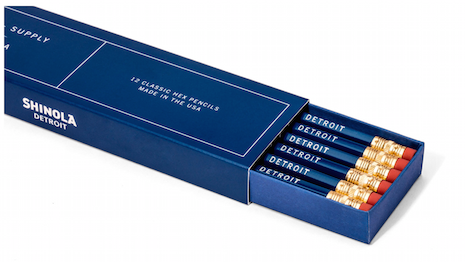
 Penciling in luxury
Penciling in luxury
 At the core of luxury
At the core of luxury Montblanc channels JFK
Montblanc channels JFK It's Shinola's time
It's Shinola's time Nib of the matter for Montblanc
Nib of the matter for Montblanc Sizing up the market
Sizing up the market Pam Danziger
Pam Danziger